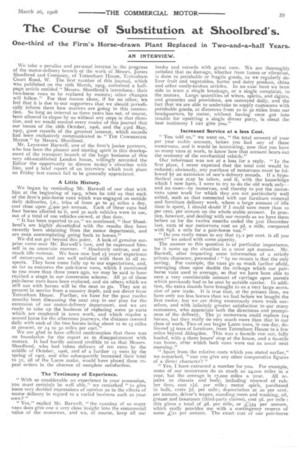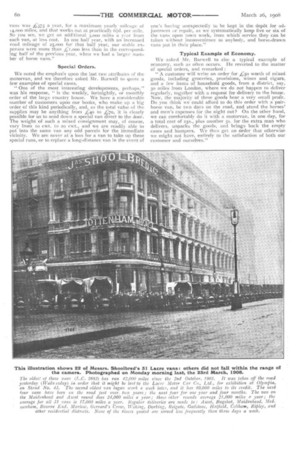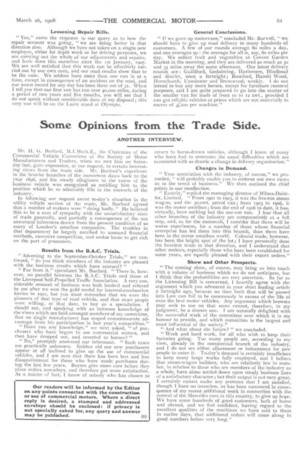The Course of Substitution at Shoolbred' s.
Page 5

Page 6

Page 7

If you've noticed an error in this article please click here to report it so we can fix it.
One-third a the Firm' s Horse-drawn Plant Replaced in Two-and-a-half Years.
AN INTERVIEW.
We take a peculiar and personal interest. in the progress of the motor-delivery branch of the work of Messrs. James Shoolbred and Company, of Tottenham House, Tcttenham Court Road, W. The first number of this journal, which was published on the a6th March, i9o5, contained a halfpage article entitled " Messrs. Shoolbred'S intentions : their two-horse vans to be replaced by motors; other changes will follow." For that reason alone, if for no other, we feel that it is due to our supporters that we should periodically inform them how matters are going in this connection. So long an interval as three years has not, of course, been allowed to elapse by us without any steps in that direction, and we would remind every reader of this journal that our issues of the r8th October, 1906, and the 23rd May, 1907, gave records of the greatest interest, which records had been exclusively communicated to "THE COMMERCIAL MOTOR" by Messrs. Shoolbred.
Mr. Leycester Barwell, one of the firm's junior partners, who has been the pioneer and moving spirit in this development of the transport branch of the huge business of this very old-established London house, willingly accorded the Editor the opportunity to discuss to-day's situation with him, and a brief report of an interview which took place on Friday last cannot fail to be generally appreciated.
A Little History.
We began by reminding Air. Barwell of our chat with him at the beginning of 1905, when he told us that each of the firm's pair-horse vans which was engaged on outside daily deliveries, i.e., trips of from 40 to 45 miles a day, cost close upon .4;400 per annum. Each of these vans had four horses allotted to it, and 30 such vehicles were in use, Out of a total of zoo vehicles owned, at that date.
" It has been reported to us," we continued, " that Shoolbred's are highly dissatisfied with the results they have recently been obtaining from the motor department, and are even contemplating going back to horses." We did not get beyond this point. A look of genuine surprise came over Mr. Barwell's face, and he expressed him self in no uncertain manner. "Absolutely untrue, and so
much idle rumour. We have now had 4years' experience of motorvans, and are well satisfied with them in all re
spects. They have come fully up to our expectations, and, so far as concerns the pair-horse vans, which I mentioned to you more than three years ago, we may be said to have reached a stage in our conversion scheme. All 30 of those pair-horse vans have been replaced, and six others which we still use with horses will be the next to go. They are at present in service from a country dep6t, and not direct from Tottenham House. Further, we have for the past twelve months been discussing the next step in our plan for. the extension of our motor-delivery department, and we are ready to take up the business of replacing some 30 carts which are employed in town work, and which require a second horse for the afternoon journeys, the distance covered daily with each of the two horses being about 12 to 15 miles at present, Or 24 to so miles per cart."
We are glad to have official confirmation that there was no foundation for the report as to disappointment with motors. It had hardly seemed credible to us that Messrs.
Shoolbred, who had taken delivery of ten vans by the middle of October, 1906, and of a further 13 vans by the spring of 1907, and who subsequently increased their total to 31, all of the Lacre make, would have placed these repeat orders in the absence of complete satisfaction.
The Testimony of Experience.
" With so considerable an experience in your possession, you must certainly be well able," we remarked " to give some very decided expressions of opinion as to the effects of motor delivery in regard to a varied business such as your own? "
" Yes," replied Mr. Barwell, "the running of so many vans does give one a very close insight into the commercial value of the motorvan, and we, of course, keep all our
books and records with great care. We are thoroughly satisfied that no damage, whether from fumes or vibration, is done to perishable or fragile goods, as we regularly deliver fruit and vegetables, butter and dairy produce, china and other easily-broken articles. In no case have we been able to trace a single breakage, or a single complaint, to the motors. Large quantities of wines, spirits, and cigars, and groceries and provisions, are conveyed daily, and the fact that we are able to undertake to supply customers with perishable goods, at distances from to to 30 miles from our headquarters, by motor, without having once got into trouble for upsetting a single dinner party, is about the best testimony I can give you."
Increased Service at a less Cost.
" You told us," we went on, " the total amount of your per year stable account, before you had any of these
rnotorvans, and it would be interesting' now that you have so many vans at work, to know howthat account bears out the economy of the mechanical vehicle."
Our informant was not at a loss for a reply. " In the first place, I never expected that the total cost would be
reduced; obviously, any purchase of motorvans must be followed by an extension of one's delivery rounds. If a hypothetical case may be taken, and if, with the knowledge which I now have, I were to try to do the old work only—
and no more—by rnotorvan, and thereby to put the motorvans upon work for which they are not particularly well suited, such as that connected with our furniture removal and furniture delivery work, where a large amount of idle time is spent, I should doubt if I could save more than to per cent. per annum on the whole stable account. In practice, however, and dealing with our records as we have them before us for the twelve months ended the 31st December last, each of our motorvans cost us 5d. a mile, compared with 6id. a mile for a pair-horse van."
" Do you really mean to say that 23.1 per cent. is all you save?" we asked with some asperity.
The answer to this question is of particular importance, for it sums up the situation in a most apt manner. Mr. Barwell, after imparting some information of a strictly private character, proceeded : "by no means is that the only saving. For example, the vans go so much further afield, averaging close upon double the mileage which our pair horse vans used to average, so that we have been able to save a very considerable amount of carriage upon parcels which previously had to be sent by outside carrier. In addi tion, the extra rounds have brought to us a very large accession of new trade. It is true that, at the present time, we have only roo less horses than we had before we bought the first motor, but we are doing enormously more work ourselves, and with infinitely greater satisfaction to our many customers, who appreciate both the directness and prompt ness of the delivery. The 31 motorvans could replace 124 horses, but they really do very much more than that in our
class of work. Two of our larger Lacre vans, in one day, de livered 3 tons of furniture, from Tottenham House to a few miles beyond Abingdon. This was a 6o-mile run out, fully
loaded, with a three hours' stop at the house, and a 6o-mile run home, after which both vans were out as usual next morning." " Apart from the relative costs which you stated earlier," we remarked, " can you give any other comparative figures of a direct character? "
"Yes, I have extracted a number for you. For example, some of our motorvans do as much as 24,000 miles in a
year, hut the average is 17,000 miles a year. All re
pairs to chassis and body, including renewal of rubber tires, cost 14d. per mile; motor spirit, purchased in bulk, costs id. per mile ; depreciation at zo per cent. per annum, driver's wages, standing room and washing, oil, grease and insurance (third-party claims), cost 3d. per mile :
this gives a total of 5d. per mile, or ,E14per annum, which really provides me with a contingency reserve of some .4-21 per annum. The exact cost of our pair-horse vans was 4'375 a year, for a maximum vearly mileage of 14,000 miles, and that works out at practically W. per mile. So you see, we get an additional 3,000 miles a year from each van, at less cost. In one half year, with an increased road mileage of 25,000 for that half year, our stable expenses were more than ;0,000 less than in the corresponding half of the previous year, when we had a larger number of horse vans."
Special Orders.
We noted the emphasis upon the last two attributes of the motorvan, and we therefore asked Mr. Barwell to quote a few examples of special cases.
" One of the most interesting developments, perhaps," was his response, " is the weekly, fortnightly, or monthly order of the large country house. We have a considerable number of customers upon our books, who make up a big order of this kind periodically, and, as the total value of the supplies may be anything from L:40 to ,4.70, it is clearly possible for us to send down a special van direct to the door. The weight of such a mixed consignment may, of course, vary from to cwt. to 20 cwt., and we are readily able to put into the same van any odd parcels for the immediate vicinity. We are never at a loss for a van to take up these special runs, or to replace a long-distance van in the event of
one's having unexpectedly to be kept in the depot for adjustment or repair, as we systematically keep five or six of the vans upon town work, from which service they Can be taken without inconvenience to anybody, and horse-drawn vans put in their place."
Typical Example of Economy.
We asked Mr. Barwell to cite a typical example of economy, such as often occurs. He reverted to the matter of special orders, and remarked :
"A customer will write an order for .;',5o worth of mixed goods, including groceries, provisions, wines and cigars, and a few items of household goods, from a district, say, 30 miles from London, where we do not happen to deliver regularly, together with a request for delivery to the house. Now, the majority of these goods hear a very small profit. Do you think we could afford to do this order with a pairhorse van, be two days on the road, and stand the horses' and men's expenses for the night out? On the other hand, we can comfortably do it with a motorvan, in one day, for a total cost of 25s., plus another 5s. for the extra man who delivers, unpacks the goods, and brings back the empty cases and hampers. We thus get an order that otherwise we might not have, entirely to the satisfaction of both our customer and ourselves."
Lessening Repair Bills.
"Yes," came the response to our query as to how the repair account was going, " we are doing better in that direction also. Although we have not taken on a single new employee, either for &pert work or for driving purposes, we are carrying out the whole of our adjustments and repairs, and have done this ourselves since the ist January, 1907. We are well satisfied that this work can be effectively carried out by our own men, and our road results show that to be the case. We seldom have more than one van in at a time, except in consequence of an accident on the road, and our worst record for any day has been three out of 31. When I tell you that our first van has run over 40,000 miles, during a period of two years and five months, you will see that I do not speak without considerable data at my disposal; this very van will be on the Lacre stand at Olympia. General Conclusions.
" If we gave up motorvans," concluded Mr. Barwell, "we should have to give up road delivery to many hundreds of customers. A few of our rounds average 8o miles a day, and one averages go : the average for all is, say, 6o miles per day. We collect fruit and vegetables at Covent Garden Market in the morning, and they are delivered as much as so and 35 miles away the same afternoon. Our latest delivery rounds are : Guildford, Godalming, Hazlemere, Hindhead and district, once a fortnight ; Romford, Harold Wood, Hornchurch, LTpininster and Brentwood, weekly. I do not intend to buy any more horses, except for furniture removal purposes, and I am quite prepared to go into the matter of the smaller van for loads of from to to 12 cwt., provided I can get reliable vehicles at prices which are not materially in excess of 4.200 per machine."




































